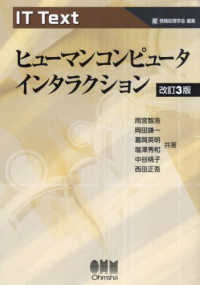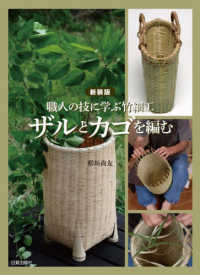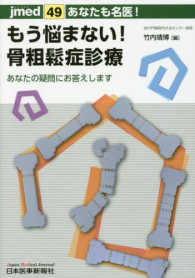- ホーム
- > 洋書
- > 英文書
- > History / World
Full Description
This book aims to offer ideas and examples of pedagogy in the undergraduate classroom. The basic premise taken by the authors begins with a question: What if stereotypes surrounding Japan were not pushed to the margins in teaching but took center stage and were exposed for the multiple ways that they can be used to learn not only about "Japan" but of various scholarly disciplines? The task then becomes constructing ways to challenge essentialist notions that do not seek merely to deny, but to shift the conversation constructively by encouraging engagement with a theoretical field from which to acquire tools to critically and effectively evaluate stereotypes of Japan or other societies. The result is a collection of carefully crafted case studies of syllabi that showcase pedagogies aimed at the deconstruction of concepts such as "Japan," "Japanese," or "Japanese society" while at the same time offering skills of inquiry that transcend the topics being deconstructed. This handbook is a source of ideas from colleagues in a variety of disciplinary and institutional settings, who are tackling the same issues current or future teachers who plan to use case studies from Japan in their lectures.
Contents
Introduction: Critical Pedagogy as Public, Scholarly Engagement (Ioannis Gaitanidis and Gregory S. Poole), Part 1: Critiquing by Reflecting on Acquired Knowledge:, 1. Reconstructing the Narrative of Because Japan is an Island: Discussions of Immigration, Migration, and Refugee Policy (Ayako Sasaki), 2. On Pedagogy and the Personal: Teaching Media, the Nation, and Globalization about/in Japan (Stevie Suan), 3. Filtrating Misconceptions about Science and Technology through Japanese History (Yulia Frumer), 4. Teaching Gender and the Politics of Reproduction in Japan: Self-Government as Theoretical Reference Point (Isabel Fassbender), 5. Disentangling Japanese Religion in the Classroom (Satoko Fujiwara and Ioannis Gaitanidis), Part 2: Critiquing by Comparing (with Oneself and with Others):, 6. Out of Site, Out of Mind? Ethnographies of Japan, Outside Japan (Chris McMorran), 7. Challenging the Ideas of Japan and Japanese Language in a Foreign Language Classroom: Linguistic Landscapes Project (Yuri Kumagai), 8. History and Holism: Making Sense of the Anthropology of Japan (Nana Okura Gagne), 9. Deconstructing Japan through a Border Crossing Lens (Tomoko Tokunaga);, 10. Applying Intersectionality to the Study of Social Inequalities in Japan (Jennifer M. McGuire), Part 3: Critiquing by Creating:, 11. Undoing Japan in global education: Three Class Projects for Dismantling Culturalist Portrayals of Society (Neriko Musha Doerr), 12 Japanese Gardens as a Zone of Contact for Teaching (Christian Tagsold), 13. From Japanese in the US to Foreigner in Japan: Unpacking Race in Representations (Satoko Shao-Kobayashi), 14. The Materiality of Mokkan: Creating Sources for Reflection on Text in Ancient Japan (Paula R. Curtis), Part 4: Critiquing through Curriculum-Building:, 15. The Visual Anthropology of Japan: In and Outside the Classroom (Steven C. Fedorowicz), 16. Teaching the Anthropology of Japan at French Universities (Alice Berthon, Alice Doublier, Charlotte Lamotte), 17. Teaching the Japanese Workplace: From Principles to Practice (and Back Again).








